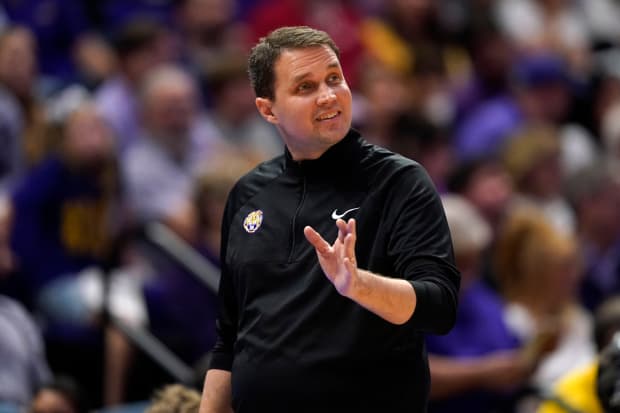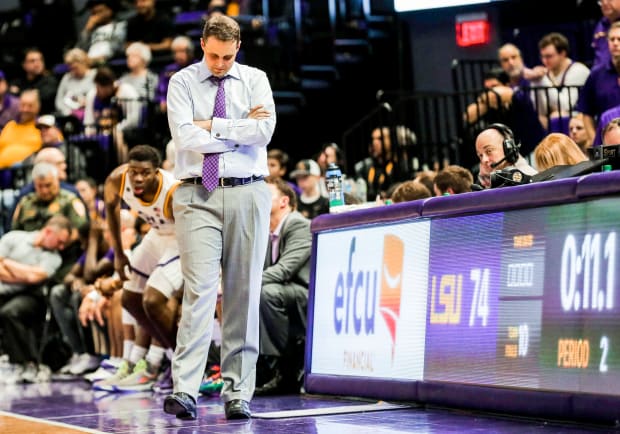Now that one of the greasiest characters in the history of a notoriously sketchy sport has been dismissed, let’s take a moment to do two things.
First, let’s congratulate LSU men’s basketball coach Will Wade on earning a special footnote in history. Has anyone ever been fired the day before his NCAA tournament-bound team finds out its Selection Sunday seeding and opponent? That’s a special level of repudiation. Wade earned all the humiliation that comes with it.
Second, let’s consider the collateral damage that went along with LSU’s craven and brazen enablement of the four-year Wade con job.

Gerald Herbert/Associated Press
Consider aspiring sports agent Christian Dawkins and Adidas consultant Merl Code, busted for their roles in a federal bribery scandal. Dawkins was on the other end of the phone when Wade was discussing his infamous “strong-ass offer” to land recruit Javonte Smart. Wade went on making millions as the coach of the Tigers for three years after the contents of that wiretapped call were released. Dawkins and Code are currently in federal prison.
Consider the Black assistant coaches who lost their jobs as the feds kept their investigative sights small, never putting Wade on the witness stand or pursuing charges against him. Wade was going to NCAA tournaments while they were pushed out of the profession.
Consider Missouri coach Cuonzo Martin and Georgia coach Tom Crean, both fired this week for not winning enough games in the Southeastern Conference. They were a combined 1–11 against Wade, with his continued employment tangibly affecting theirs.
Consider Florida coach Mike White, who is catching heat from the Gators’ fan base because his team is probably on the wrong side of the NCAA bubble. A January loss against LSU and Wade might be the difference between the NCAA and NIT.
Then, there’s former Vanderbilt coach Bryce Drew, whose last loss to cement a winless SEC season in 2019 was a 21-point drubbing from LSU. Drew was fired not long thereafter.
And there’s Mark Turgeon, who had a mutual parting with Maryland early this season; a last-second loss against LSU in the 2019 tournament kept his Terrapins from the Sweet 16. Is he still the coach at Maryland if Wade’s team didn’t stand in the way of that tournament run?
Yeah, a lot of people paid pretty dearly while Wade kept getting paid by LSU. Now that he’s finally gone, fired Saturday in the aftermath of the school receiving a whopper notice of allegations from the NCAA’s Complex Case Unit offshoot—the existence of which Sports Illustrated first reported Tuesday—the schadenfreude rocketing around the sport is palpable.
For three years, the most-asked question I’ve received from people in college athletics is this: “How does Will Wade still have a job?” The answer: LSU, in its rush to the rock-bottom depths of athletic accountability, simply didn’t care about the mockery Wade had made of NCAA rules and competitive fairness. The school should be embarrassed today, but I’m not sure LSU is capable of embarrassment. If it were, LSU wouldn’t be facing a Lack of Institutional Control charge from the NCAA that alleges eight years of sustained misconduct in multiple sports. In the eyes of the investigators, LSU was running a rogue operation and not overly concerned about it as long as the wins kept coming.
Wade became the face—and voice—of it. His words on a wiretap from a call intercepted by the FBI made it completely clear he was buying a player (and, as the notice of allegations asserts, Javonte Smart was hardly the only one). To listen to that tape and not come to that obvious conclusion was to lie to yourself and everyone else. LSU chose the dishonest route, and stuck to it.

Derick E. Hingle-USA TODAY Sports
Wade’s reaction to the wiretap news when Yahoo! Sports broke it in March 2019 was to refuse to meet with his bosses and answer questions. That earned him a suspension from the SEC tournament. Watching the team accept the trophy in Nashville as the regular-season champion while their coach was back home in Baton Rouge would humiliate a coach with any credibility. Wade never seemed too ashamed about that.
But after Wade changed course and met with the school and NCAA investigators, LSU caved in the face of aggressive lawyering and kept him employed. It added an amendment to his contract that helped facilitate his firing, saying he could be dismissed with cause if he were charged with major violations. But LSU administrators refused to step up and strongly deal with a popular, winning coach.
It got worse at SEC spring meetings in May 2019. Wade fumbled his way through a laughable press conference, refusing to answer hard questions, looking and sounding like a teenager trying to explain to his parents why he broke curfew. LSU stood idly by, watching its coach make a fool of himself.
Then, as NCAA infractions cases tend to do, the affair went underground for a long period of time. LSU fans, and fanboy media, so desperate to believe nothing would happen, declared it a dead issue. LSU administrators seemed to hope the thing would dry up and blow away as well.
But, behind the scenes, the work went on. The NCAA Enforcement staff, and later the Complex Case Unit of the Independent Accountability Review Process, methodically built its case.
And boy howdy, did they deliver an NOA. Eleven alleged violations, eight of them Level I (the most severe), with the Lack of Institutional Control charge as the cherry on top. The CCU threw both at LSU, and Wade in particular.
In addition to the “strong-ass offer” allegation, there is one alleging Wade paid hush money to the former fiancé of a former player in 2017. LSU apologists who tried to explain away the wiretap are going to really be taxed when it comes to dismissing this one.
Another allegation: In 2020, well after Wade was under the microscope for the wiretap, he and assistant coach Bill Armstrong provided an array of impermissible benefits. The NOA specifically states Armstrong “offered to provide [name redacted] and/or his family members or associates with $300,000 cash. …” A source with ties to the LSU program told Sports Illustrated years ago that Wade and his staff were making six-figure offers to multiple recruits and named two of them who became standout players for the Tigers.
There was also an allegation Wade obstructed (and elongated) the NCAA investigation by refusing to supply records. (The texts with the former fiancé show exactly why Wade didn’t want to cooperate.) Although there are no details attached, a look at the case’s timeline makes clear that disputes over documents and other legal wrangling inhibited a more timely resolution. And while Wade was obstructing, LSU was still sending him fat paychecks.
The football allegations in the NOA are not small potatoes, either. The biggest is a $180,000 payment from a booster to the father of a player for a no-show job, but if you want a window into how LSU has operated, the fallout from Odell Beckham Jr.’s doling out of cash in the immediate aftermath of winning the College Football Playoff in January 2020 provides a beauty. The violation itself is not terribly scandalous. But when the school’s response to the media was that Beckham was handing out fake money, it showed that its first institutional instinct was to brazenly lie. It was only later, when quarterback Joe Burrow acknowledged during a national media appearance that the money was real, that LSU backtracked.
No wonder the con-man basketball coach felt right at home there.
LSU said in a statement Saturday it does not agree with all the charges and likely will contest some of them (though it has already conceded the football charges). This might not all stick to the Tigers through a hearing and subsequent ruling, which will come somewhere down the line in 2022.
Still, it would take a miracle—or some staggering incompetence on the part of either the CCU or the IARP hearing panel—for this not to result in major sanctions. Will Wade will never coach college basketball again, and the profession will be better because of it. And the school will pay a price for resolutely refusing accountability.
But none of that helps those who were freshly fired or who are sitting in prison. Will Wade kept getting paid while they paid a price.







